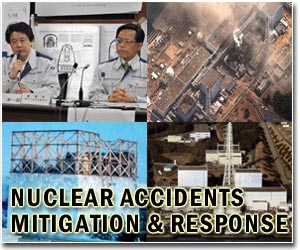Water dilemma at damaged Japan nuke plant
by Staff Writers
Tokyo (UPI) Jun 3, 2011
 disclaimer: image is for illustration purposes only |
Engineers at Japan's Fukushima Daiichi nuclear plant are struggling with what to do with 15 million gallons of contaminated water used to cool damaged reactors.
The strategy of pouring massive amounts of water into the plant to cool the reactors has had severe side effects, with limited options on what to do with the contaminated water, The Washington Post reported Friday.
The contaminated water covers the basement floors, is leaking into the environment and constitutes a danger to any worker who goes near it, the newspaper said.
Engineers facing an unprecedented clean-up job must consider where they'll dispose of the water and how effectively they can treat it to remove radioactive particles.
The problem faced by Tokyo Electric Power Co. "resembles a board game with 16 squares and one empty spot," said David Lochbaum, a nuclear engineer who directs the Nuclear Safety Project of the Union of Concerned Scientists.
Workers must inject the reactor cores with water to keep them cool, but contaminated water leaking into the basement-level turbine rooms of the quake-damaged plant makes repair work all the harder as workers must continue to "feed and bleed" the reactors from above.
"They're just perpetuating the problem and making a bigger and bigger mess," said Lake Barrett, a nuclear engineer who directed the cleanup of the damaged Three Mile Island plant in Pennsylvania.
Tepco said it plans to begin a process in which water is sucked from the basement rooms and treated with chemicals that remove its radioactivity, a process that creates a radioactive sludge byproduct that then must be dealt with.
The process "is not 100 percent, but it's better than nothing," Lochbaum said. "The alternative: you let the water simply evaporate and radioactivity carries to all parts far and wide."
earlier related report
Two Japan nuclear workers 'exceed radiation level'
Tokyo (AFP) June 3, 2011 - Two workers at Japan's crippled Fukushima nuclear power plant have been exposed to radiation exceeding the maximum limit for employees tackling the emergency, Kyodo news agency reported Friday.
Plant operator Tokyo Electric Power Co. (TEPCO) also said there may be more workers who have been exposed to large doses of radiation, Kyodo said.
The government raised the maximum legal limit from 100 millisieverts to 250 millisieverts to cope with the crisis at the plant which was crippled by the March 11 earthquake and tsunami and has since leaked radiation into the air, ground and sea.
Tests suggested the two men had been exposed to between 210 to 580 millisieverts and 200 to 570 millisieverts respectively, Kyodo said, quoting TEPCO officials.
The workers had been dealing with the No. 3 and No. 4 reactors and the reactors' central control rooms. TEPCO planned to check around 150 other employees who were working in areas with similar exposure risks, the officials told Kyodo.
A level of 250 millisieverts is 250 times what an ordinary person is exposed to in a year.
Exceeding the legal level in the course of work is illegal in Japan and a plant worker who reaches the limit will be relieved of his duties for life.
The level is five times that allowed for plant workers in the United States and 12 times that for France.
Japan's magnitude 9.0 seabed quake and tsunami caused the world's worst nuclear disaster since Chernobyl 25 years ago at the Fukushima plant.
TEPCO has said it hopes to bring the plant to a stable state of "cold shutdown", with low pressure and temperatures, some time between October and January.
Japan has evacuated tens of thousands of people from a 20 kilometre (12 mile) zone around the stricken plant, and from some areas beyond which have received high doses of aerial radiation.








No comments